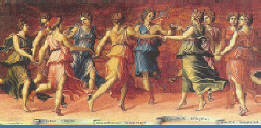|
|
Storm was born into a well to do family of lawyers in Husum, a small town on the west coast
of the now Schleswig-Holstein but, at that time, part of Denmark. He attended schools
locally and at Lübeck until reading law at the universities of Kiel and Berlin. He turned
early in life to poetry in which he was influenced by Eichendorff and Heine and published
a collection of Schleswig folk tales jointly with two friends.
He returned to Husum in 1843 to establish a law practice, married in 1846 and wrote his
acclaimed novel Immensee in 1849. He published "Gedichte" (Poems) in 1852 but his German
sympathies led to withdrawal of his accreditation by the Danish authorities in that year
and he was compelled to take a low position in the Potsdam legal fraternity with the
aid of parental financial assistance.
He subsequently became a district judge in Heiligenstadt, Thuringia in 1856 but returned
to Husum in 1864 having been appointed judge after the incorporation of Schleswig into
Prussia subsequent to the defeat of Denmark in the war of that year. Following the death of his wife in 1866, which gave impulse to a further poetry collection, "Tiefe Schatten" (Deep Shadows), he married again in the following year. He sought early retirement from 1880 moving to Hademarschen, to the south of Husum, where he wrote several of his mature novels including "Der Schimmelreiter" (The White Horse Rider) which was completed shortly before his death from cancer.
Storm is recognized as both poet and novelist ranking amongst the greatest of the century. His works largely address the decency and struggles of the rustic community and reflect his feelings for his native district. He is commemorated in several memorials in his birth town of Husum where he is interred.
|

